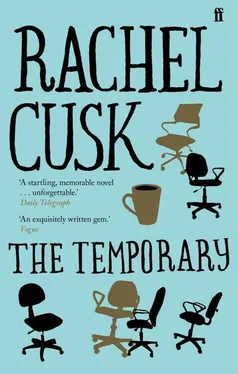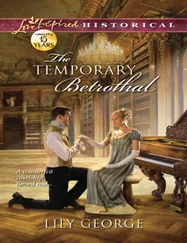Rachel Cusk - The Temporary
Здесь есть возможность читать онлайн «Rachel Cusk - The Temporary» весь текст электронной книги совершенно бесплатно (целиком полную версию без сокращений). В некоторых случаях можно слушать аудио, скачать через торрент в формате fb2 и присутствует краткое содержание. Год выпуска: 2013, Издательство: Faber & Faber, Жанр: Современная проза, на английском языке. Описание произведения, (предисловие) а так же отзывы посетителей доступны на портале библиотеки ЛибКат.
- Название:The Temporary
- Автор:
- Издательство:Faber & Faber
- Жанр:
- Год:2013
- ISBN:нет данных
- Рейтинг книги:5 / 5. Голосов: 1
-
Избранное:Добавить в избранное
- Отзывы:
-
Ваша оценка:
- 100
- 1
- 2
- 3
- 4
- 5
The Temporary: краткое содержание, описание и аннотация
Предлагаем к чтению аннотацию, описание, краткое содержание или предисловие (зависит от того, что написал сам автор книги «The Temporary»). Если вы не нашли необходимую информацию о книге — напишите в комментариях, мы постараемся отыскать её.
The Temporary — читать онлайн бесплатно полную книгу (весь текст) целиком
Ниже представлен текст книги, разбитый по страницам. Система сохранения места последней прочитанной страницы, позволяет с удобством читать онлайн бесплатно книгу «The Temporary», без необходимости каждый раз заново искать на чём Вы остановились. Поставьте закладку, и сможете в любой момент перейти на страницу, на которой закончили чтение.
Интервал:
Закладка:
To his initial embarrassment and later concern, she gave Ralph money too, and although his stomach would knot with anxiety at the thought that she might pay him in front of Stephen, she never did. She would leave the money in his room or catch him on his own, her manner cool and confusing with discretion, and afterwards she would sometimes stroke his hair. He was grateful for it, of course, for he had little money of his own — just what his father had left him in a policy for his weekly upkeep, the rest to be collected when he came of age — and Stephen always liked to do expensive things when they were in London. Lady Sparks seemed to know just when his supplies were dwindling, and having learnt the secret of her acuity Ralph cultivated a slightly fearful respect for her. She was a small and elegant woman, so unlike the memory he had of his own mother, with a distracted, aristocratic voice and the redundant manners, the despairing aloofness, of a displaced, abandoned queen. She could unnerve Ralph if he was left alone with her for too long without the emboldening presence of Stephen’s bravado, by looking at him so blankly that he thought she was mad. He knew Stephen had had a brother when he was very young who had fallen out of their car on a motorway and died, and although he sometimes thought that Lady Sparks perhaps liked him because of the brother, and might even want to adopt him as a replacement, the sight of her pale, empty eyes told him that she didn’t feel that way at all. Stephen would do imitations of her when they were on their own, rolling his eyes back into his head and speaking in a feeble, effeminate voice until Ralph cried with guilty laughter. He said that his father had divorced her so that he could marry his French girlfriend Isobelle, with whom he now lived in a big house in the French countryside. Stephen went to stay with them sometimes during the summer and Ralph would have to go to London alone, where he crept nervously through the great, cool rooms to avoid the drifting ghost of Lady Sparks and more often than not kept to his bedroom and read during the hot days. Usually it was only for a week or two, though, and while Stephen would often say that he was going for Easter or Christmas, or for the two whole months of the summer, when the time came more often than not something ‘came up’ and he didn’t go. Ralph had never met Stephen’s father, or Isobelle, whom Stephen used to describe to the boys at school, claiming that he had once hidden in a wardrobe in their bedroom and watched them having sex through a crack in the door. They had two small children with French names which Ralph couldn’t remember.
They would usually go to Camden in a black cab hailed in the street by Stephen. Ralph would sit in it, filled with the inebriation of awe and with a sense of how randomly this grace had fallen upon him, how little it had to do with anything that had happened to him before. He wondered now if his own occasional but nevertheless illogical habit of taking cabs existed in deference to those cloistered journeys, which he looked back on amazed that his younger self had felt no embarrassment when emerging from them into the cheerful anarchy of Camden High Street. The area had a significance for him, though, which he did not wish to escape: they had sat in pubs, had looked at people unlike themselves, had bought records and even ‘scored’, as they had called it, from skinny fetid men in the street — not like now, Ralph thought, when Stephen seemed to have a minion for every drug he used, a book full of telephone numbers to be dialled at all times, the late-night ringing of the bell. Stephen had used to ‘skin up’, another phrase which now seemed foreign to him but which once he had had tamed on his tongue, in broad daylight, and Ralph would take panicked nips at it, not really feeling anything. It couldn’t have been very good, he thought now. He had taken things since which had made him feel so far inside himself that his voice was like a megaphone in the pit of his stomach trying to project things out of his mouth.
He smiled as he trudged over Camden Lock with the two bags of shopping he had bought at great but unheeded expense at a delicatessen opposite the Tube station. Even then, he remembered, Stephen had used to change his voice, adopting a colourful proletarian twang, like something out of an Ealing comedy, through which his precise vowels would protrude like limbs from an ill-fitting set of clothes. These days the contrast was less amusing, for the two had almost merged into a single all-purpose voice. When he telephoned Ralph, Stephen would often say things like ‘all right?’ instead of ‘hello’, or ‘see you later’ when Ralph wasn’t going to see him later at all.
He reached his street, changing the bags to opposite hands. He had told Neil he was going to the doctor and had managed to get away early, something he had used to do frequently in the first, desperate months of his job. Eventually, though, things had changed, not at work but in his own acceptance of it: he had come to believe that there was nothing else, that this was the life that had been laid out for him, like a meal at a stranger’s house, and that if he didn’t like it he must change until he did, for there was nothing else.
It was not quite dark yet, the sky watery and blue with the aftermath of the afternoon’s cold sun, but the air had grown thin and icy and Ralph was surprised to see children in T-shirts wheeling and chattering round the street on their bikes. They were a familiar motif of summer to him, but he hadn’t seen them over the past few months and they had changed, had strange, brutal haircuts and new versions of their faces.
‘Hello,’ he said none the less as he passed them.
They looked round at him but didn’t reply, their compressed mouths bursting with suspicious humour. As he reached his flat and took out his keys he heard a volley of cries behind him.
‘’ Allo ! ’ Allo !’ they shouted in voices effete with vaudeville mimicry.
He shut the door, hoping they wouldn’t be there by the time Francine arrived. He tried to imagine her in his road, a strange and beautiful fruit suddenly appearing on the bare branches of the sentinel winter trees which lined it. For a moment he felt faint at the prospect of the evening ahead, his responsibility for it, and almost decided there and then just to take her to a restaurant and be done with it. He put the bags of food on the kitchen table and sat down with his head in his hands. A thread of self-consciousness stole through him as he did so. He was the picture of despair, like somebody in a film. He laughed aloud at his own comedy. He would do exactly what he had set out to do: he had bought food and wine, had rendered the flat unrecognizable with order the night before, had even had his hair cut on the Holloway Road at lunch-time.
‘Get the doctor to do something about your hair, mate,’ Neil had said, folding over with his own hilarity, when Ralph had left for his fictitious appointment at four o’clock.
He stood and went to look at himself in the hall mirror. The cut made his face appear rather beefy, giving it the exposed, foolish look of a passport photograph. He ruffled it a bit and saw a spray of dark filaments fall gently to his shoulders. He turned away from the mirror, his face itchy and hot. He had planned to do the cooking first and then get himself ready at the last minute. He had ruled out the temptation to make something elaborate: it wasn’t much of a temptation in any case, as his preliminary skim through his only cookery book — a strange fifteenth-birthday present from Lady Sparks, with garish photographs of prone crustaceans spewing lumpy substances from their backs — had informed him that he possessed neither the utensils nor the skills even the simplest dish demanded for its creation. He would make a risotto, something he had learned to do as a student; never properly, of course, merely approaching it by intuition and experiment, until finally he’d made it for a group of friends who’d called it risotto and said how much they’d liked it. This time, he had bought expensive things to put in it, which probably could have formed something more impressive if he assembled them in a different way, but the expansive, forgiving framework of the risotto offered an indispensable form of insurance against disaster.
Читать дальшеИнтервал:
Закладка:
Похожие книги на «The Temporary»
Представляем Вашему вниманию похожие книги на «The Temporary» списком для выбора. Мы отобрали схожую по названию и смыслу литературу в надежде предоставить читателям больше вариантов отыскать новые, интересные, ещё непрочитанные произведения.
Обсуждение, отзывы о книге «The Temporary» и просто собственные мнения читателей. Оставьте ваши комментарии, напишите, что Вы думаете о произведении, его смысле или главных героях. Укажите что конкретно понравилось, а что нет, и почему Вы так считаете.












